democracynow.org
Stories:

Keep Oil in the Soil: Bill McKibben on Being Named by Sanders to DNC Platform Committee
Bill McKibben was just named by Bernie Sanders to serve on the platform committee at this year’s Democratic National Convention. He joins Sanders’ other four appointments: scholar and racial justice activist Cornel West; Native American activist Deborah Parker; Minnesota Congressmember Keith Ellison, who chairs the Congressional Progressive Caucus; and Palestinian rights activist and scholar James Zogby, who founded the Arab American Institute. We speak with 350.org co-founder Bill McKibben about how he’ll seek to translate his activism into Democratic Party platforms in Philadelphia in July.
TRANSCRIPT
This is a rush transcript. Copy may not be in its final form.
AMY GOODMAN: Very quickly, before we end, Bill McKibben, I want to ask you about another issue. You were just named by Senator Sanders to serve on the platform committee at this year’s Democratic National Convention, along with scholar Cornel West; Native American activist Deborah Parker; Minnesota Congressmember Keith Ellison, who chairs the Congressional Progressive Caucus; and the Palestinian rights activist and scholar Jim Zogby, who founded the American Arab Institute. Can you talk about what you want to see in the Democratic platform, what you’re going to be pushing for?
BILL McKIBBEN: Sure. I think my job here—I mean, I think, look, this is not my normal—you know, I’m more likely to be found outside protesting than inside, but Bernie has earned the right to ask people, I think, at this point, to help him. And so, when he asked, I said I would. And what I’ll do is try to focus on the things that he’s been talking about with climate and energy throughout the campaign, trying to close down as much as we can of this expansion of the fracking industry, trying to keep fossil fuel in the ground on public lands, the Keep It in the Ground Act that he co-sponsored, that Senator Merkley of Oregon wrote—things like that, that have been part of the reason that people have been rallying to his standard.
AMY GOODMAN: Would you call for a moratorium on fracking?
BILL McKIBBEN: Well, I don’t—I mean, I don’t know what the language will be or even quite what that would mean, but I think at this point the key is at least to keep it from growing any faster than it can. I wrote a long piece in the cover of The Nation about a month ago just explaining that what we’ve learned about the science over the last two or three years makes it extraordinarily clear that it’s not only desperately dangerous for people in their local communities, but also for the planet, because the leakage of that methane into the atmosphere, that CH4, is darn near as dangerous as what we’re doing with carbon dioxide.
AMY GOODMAN: Finally, how would it translate into a platform to keep the oil in the soil? What exactly would you call for?
BILL McKIBBEN: Well, I think that the best sort of example of that we have so far is this Keep It in the Ground Act of 2015 that Senator Merkley introduced. In fact, I was up on the Hill the day that he introduced it. And Senator Sanders was there, as well as the other—one of the other co-sponsors. That’s a really powerful and interesting piece of legislation.
AMY GOODMAN: Well, I want to thank you for joining us, Bill McKibben, co-founder of 350.org, scholar-in-residence at Middlebury College. We’ll link to your piece in The Guardian headlined "Let’s give up the climate change charade: Exxon won’t change its stripes." Author of many books, including Oil and Honey: The Education of an Unlikely Activist. He has been named by Senator Sanders to the platform committee of the Democratic National Convention that will take place in Philadelphia in July. And, of course, Democracy Now! will be there throughout. Thank you also to Anna Kalinsky, granddaughter of James Black, who worked for decades as a scientist at Exxon. He alerted the company executives to the original scientific findings of climate change in the 1970s. And she, Anna, questioned the CEO of Exxon yesterday at the Exxon shareholders meeting in Dallas, where she’s speaking to us today. This is Democracy Now! We’ll be back in a minute. ... Read More →

"Significant Security Risks": State Department Says Clinton Broke Rules Using Private Email Server
An internal government watchdog has concluded Hillary Clinton broke government rules by using a private email server without approval while she was secretary of state. That was the key finding of a long-awaited report by the State Department inspector general. The report concluded that Clinton would not have been allowed to use a private server in her home had she asked department officials in charge of information security, because it posed "significant security risks." This contradicts claims by Clinton that use of a home server was allowed and that no permission was needed. The report also criticized Clinton for not properly preserving emails she wrote and received on her personal account. According to the report, Clinton and eight of her deputies, including Cheryl Mills, Jake Sullivan and Huma Abedin, declined to be interviewed for the inspector general’s investigation. Clinton’s use of a private email server for State Department business is also the subject of an ongoing FBI investigation. We speak to journalist Michael Tracey.
TRANSCRIPT
This is a rush transcript. Copy may not be in its final form.
NERMEEN SHAIKH: An internal government watchdog has concluded Hillary Clinton broke government rules by using a private email server without approval while she was secretary of state. That was the key finding of a long-awaited report by the State Department inspector general. The report concluded that Clinton would not have been allowed to use a private server in her home had she asked department officials in charge of information security, because it posed, quote, "significant security risks." This contradicts claims by Clinton that use of a home server was allowed and that no permission was needed. The report also criticized Clinton for not properly preserving emails she wrote and received on her personal account. Clinton responded to the report during a campaign event in California [sic].
HILLARY CLINTON: [speaking at a press conference at the United Nations in March 2015] Looking back, it would have been better had I simply used a second email account and carried a second phone, but at the time this didn’t seem like an issue.
AMY GOODMAN: Though Hillary Clinton said she would comply with all probes into the server use, Clinton and eight of her deputies, including Cheryl Mills, Jake Sullivan and Huma Abedin, declined to be interviewed for the inspector general’s investigation. The FBI is conducting a separate inquiry into whether Clinton mishandled classified information. Liz Hempowicz of the group Project on Government Oversight responded by saying the inspector general’s report exposed a double standard in government, that those at the top are allowed to break the rules, while whistleblowers face retribution.
LIZ HEMPOWICZ: It’s very clear that the highest levels of our federal officials don’t believe that these rules apply to them. I think they absolutely should.
AMY GOODMAN: For more on the findings and the fallout of the inspector general’s report about Hillary Clinton’s email, we’re joined by journalist Michael Tracey, frequent contributor to Vice, The Daily Beast, the New York Daily News.
Welcome to Democracy Now!, Michael. Talk about what you think is the most significant finding of the inspector general.
MICHAEL TRACEY: Well, in addition to the substance of what was found by the inspector general regarding her conduct with installing a private email server, what really stuck out to me and, I think, most observers was that she declined to be interviewed for the probe. Now, throughout her campaign and even prior to the campaign, she gave repeated assurances that she would comply with every single investigation into the propriety of this conduct. And for her now to have—to have been revealed that she did not comply with a probe overseen by the department which she headed for four years is pretty astonishing.
AMY GOODMAN: Because it was the inspector general of the State Department.
MICHAEL TRACEY: Of the State Department, right. And she was the head of that agency for four years. And not only did she not participate, but actually at least nine of her associates, whether they were employees of the department or external employees that were under the auspice of Hillary in particular, did not participate, either. So, of course that’s going to raise major questions.
NERMEEN SHAIKH: But at the same time, Hillary has said—Clinton has said that she will participate in the FBI investigation. Is that right?
MICHAEL TRACEY: Right, but if you go and examine the statements that her campaign has made and she has made individually, she never made a clear distinction between participation in the FBI probe and the State Department probe. So, for her now to retroactively claim that she did make that distinction doesn’t hold up to scrutiny. As recently as May 7th, she said that she would, quote, "talk to anybody" investigating the matter on behalf of the federal government.
NERMEEN SHAIKH: Well, she also said—because there’s been some speculation about why she chose to use a private email server in the first place, and apparently in November 2010—this is what the report says—she wrote to one of her top aides, Huma Abedin, that, quote, "Let’s [get] separate address or device but I don’t want any risk of the personal being accessible." What do you think the significance of that is? And that’s not what she initially claimed her reason was.
MICHAEL TRACEY: I just think it’s indicative of her giving a wide variety of explanations for her behavior that don’t cohere into a single, you know, digestible explanation that she could offer to voters. And I—just one more point, I think that speaks to why there’s been a deficiency in the level of scrutiny that’s been applied to it in the context of the Democratic primary. So Bernie Sanders has, validly, not raised the issue, and he has his own reasons for doing so. But the natural consequence of that is that it hasn’t been given a sufficient airing in the context of the Republican primary, and it’s going to be easily seized upon by Donald Trump in the context of a general election.
AMY GOODMAN: Let me turn to a clip from the Democratic debate in March, Clinton facing tough questioning from Univision moderator Jorge Ramos about her use of a home-based email server and who gave her permission to use it.
HILLARY CLINTON: It wasn’t the best choice. I made a mistake. It was not prohibited. It was not in any way disallowed. And as I’ve said and as now has come out, my predecessors did the same thing, and many other people in the government. But here’s the cut-to-the-chase facts. I did not send or receive any emails marked "classified" at the time. What you’re talking about is retroactive classification. ... I am not concerned about it. I am not worried about it. And no Democrat or American should be, either.
JORGE RAMOS: The questions were—Secretary Clinton, the questions were: Who gave you permission to—to operate?
HILLARY CLINTON: There—there—
JORGE RAMOS: Was it President Obama?
HILLARY CLINTON: There was no permission to be asked. It had been done by my predecessors. It was permitted. I didn’t have to ask anyone.
JORGE RAMOS: If you get indicted, would you drop out?
HILLARY CLINTON: Oh, for goodness—that is not going to happen. I’m not even answering that question.
AMY GOODMAN: Hillary Clinton, speaking at a Democratic debate in March. Just a note about the earlier clip of Hillary Clinton in our lede, it was from March 2015, over a year ago, not from the campaign trail yesterday. So, Michael Tracey, this issue of she didn’t do anything differently than her predecessors, like Secretary of State General Colin Powell, who has also said the same thing, actually?
MICHAEL TRACEY: Well, that’s been a claim repeatedly made by Hillary Clinton herself and her campaign representatives for as long as this has been a controversy, but the State Department’s own report now finds that that claim has no basis. I mean, there were new sets of standards applied to the conduct of Hillary Clinton that did not apply to her predecessors. When Colin Powell was in office, for example—you know, he left office in 2005, and by then, the use of email was not nearly as widespread or not—and the security liabilities were not nearly as well understood. So, the idea that that’s a rationale for her behavior, I don’t think passes muster, either.
AMY GOODMAN: She keeps emphasizing she’s turned over 55,000 emails, certainly more than any of her predecessors, not only Condoleezza Rice, by the way, but—not only Colin Powell, but also Condoleezza Rice. But what about this, 55,000 email that she chose, or her people chose, to hand over?
MICHAEL TRACEY: Well, again, that’s a claim that’s been made without corroboration. But now we know that the claim is not totally accurate. There were emails found independently by the State Department investigator between Hillary Clinton and David Petraeus that she did not turn over in December 2014, when she purportedly handed over the totality of the batch. So, I mean, obviously, a figure of that significance is someone who the public is going to want to see the correspondence featuring.
AMY GOODMAN: Now, this is interesting, the general, right? Because—I’m reading from The Washington Post: "In his plea agreement, [General] Petraeus admitted to mishandling classified information that was contained in [his] personal notebooks. Petraeus told [his girlfriend Paula] Broadwell that his notebooks contained 'highly classified' information, yet gave them to her ... lied to the FBI during the investigation—a felony that’s punishable by up to five years in prison," let her see his classified emails, etc.
MICHAEL TRACEY: Yeah, I think this speaks to a broader fallacy in the way that Democrats have spoken about this issue. They’ve tried to conflate it with, you know, partisan skulduggery, which inevitably is going to engulf Hillary and has for 25 years. But in doing so, they’ve deflected from the real potential liabilities that this may occasion. And another thing, you know, in the clip that was just played, Hillary Clinton laughed off the possibility of an indictment. And that’s probably remote. But it’s not laughable that there could be some kind of criminal consequence to this behavior, whether on the part of Hillary or her subordinates.
AMY GOODMAN: Well, wait. Explain this, because, I mean, James Comey is not exactly a friend of President Obama—the head of the FBI, came in under the Bush administration, has undermined him in a number of ways. There’s clearly a conflict. He’s pushing forward with this investigation. He could recommend a criminal indictment, but it would be Obama’s Justice Department that would have to move forward with it, which would set up a royal conflict and an embarrassing one.
MICHAEL TRACEY: Right. So even if official criminal charges are not levied, it would still provoke a political—a political discord that we haven’t seen in generations, in terms of competing branches of the federal government coming to different conclusions about whether certain behavior rises to the level of criminality. And, you know, I think for her to laugh off that possibility, and for Democrats to laugh off that possibility, has made it such that the feasibility of this hasn’t been seriously entertained, maybe until now. And the reason—one reason why a lawyer would advise a client not to participate in a probe of this nature is because you could divulge information that could be used in a separate criminal investigation to establish a pattern of facts, which could conceivably result in some kind of criminal charges. So that’s always been a possibility in the air, but because, you know, the allegations have been so closely associated with Republican gamesmanship, I don’t think Democrats have given it sufficient thought in terms of what kind of problems this could pose for Hillary as a general election candidate.
NERMEEN SHAIKH: Well, I want to turn to a clip from then-Secretary of State Hillary Clinton in December 2011, the day before Army whistleblower Private Chelsea Manning went on trial for passing hundreds of thousands of documents to WikiLeaks.
SECRETARY OF STATE HILLARY CLINTON: I think that in an age when so much information is, you know, flying through cyberspace, we all have to be aware of the fact that, you know, some information, which is sensitive, which does affect the security of individuals and relationships, deserves to be protected. And we will continue to take necessary steps to do so.
AMY GOODMAN: That was Hillary Clinton speaking in 2011 about the WikiLeaks revelations made by Chelsea Manning. So could you comment on what Hillary Clinton said and whether you think that there’s a different standard that’s been applied to whistleblowers, like Chelsea Manning, and her opposition to the inquiry now regarding her own, let’s say, lax security around her emails while she was secretary of state?
MICHAEL TRACEY: Well, the double standards are overwhelmingly clear. It’s not disputed at this point that information marked "top secret," according to the government, traversed the server of Hillary Clinton. And the server was not secured according to the guidelines established by the federal government. Now, had someone of less stature committed a similar infraction, based on the track record of Hillary Clinton’s own statements, we could draw a logical through line and assume that she would want the full weight of the criminal apparatus of the federal government to bear down on that individual.
NERMEEN SHAIKH: Isn’t that what happened to the U.S. ambassador in Kenya? I think that’s one of the people who’s mentioned.
MICHAEL TRACEY: Right. And, you know, obviously, the case of Chelsea Manning is not totally analogous, but it speaks to a broader principle that’s not being evenly applied. So, whether or not you think that the classification regime of the federal government is sound, that has no bearing on whether the regime that exists should be applied broadly and equitably. And in insisting, as Hillary Clinton and her surrogates have done, that this is no big deal, they’re essentially arguing for a different standard to be applied to themselves. And that’s why people have so little faith in the system. And it’s not just for product of Republican fearmongering that there is this hunch that the law is not going to be applied in an equal manner.
AMY GOODMAN: Michael Tracey, we just have a minute, but two quick questions. One, the effect of one of—the person who installed the server in the Chappaqua house being granted immunity? And the other, the reason that they would do this? Is it possible it’s related not—to not wanting to have FOIA requests of emails and questions about these emails that were involved with countries that had dealings with the Clinton Foundation?
MICHAEL TRACEY: Right. Well, a person named Bryan Pagliano has been granted immunity by the Department of Justice, and that doesn’t tend to happen unless there’s some substantial criminal proceeding having been undertaken or underway. So that’s not been given adequate consideration by Democratic partisans, either. And then, as you mentioned, there is the issue of whether public records law has been flouted. And that could conceivably—you know, depending on how enterprising a prosecutor is, could be folded into a criminal charge, because, you know, there are certain federal statutes governing how agencies and stewards of agencies must maintain public records. And there’s—you know, it’s already now established that Hillary Clinton’s maintenance of records violated the regulatory framework of the State Department. Now the only question is whether that rises to the level of a criminal violation of federal code. And it’s very possible, and, again, it’s troubling to someone who may have not given this adequate consideration. Now, I’m repeating myself, but this should have been given more of an airing in the context of the presidential—the Democratic presidential primaries, because Donald is going to have an absolute field day with it and pummel Hillary Clinton for even the appearance of some kind of impropriety, whether or not it eventuates in criminal charges.
AMY GOODMAN: Michael Tracey, I want to thank you for being with us, journalist, researcher, frequent contributor to Vice, The Daily Beast and the New York Daily News.
This is Democracy Now! When we come back, we look at an Exxon shareholders meeting, the granddaughter of an Exxon scientist who told Exxon decades ago about the dangers of climate change. We’ll also speak with Bill McKibben, who’s been chosen by presidential candidate Bernie Sanders to serve on the platform committee at the Democratic convention. What will he be demanding the platform say about climate change? Stay with us.. ... Read More →

Granddaughter of Exxon Scientist Confronts CEO over Oil Giant's Decision to Fund Climate Lies
At its annual meeting in Dallas, ExxonMobil shareholders rejected a series of resolutions Wednesday calling for climate action, including resolutions backed by CalPERS, the California Public Employees’ Retirement System, as well as New York state Comptroller Thomas DiNapoli and the Church of England. Shareholders did pass a measure to let minority shareholders nominate outsiders for seats on the board, raising the possibility that a climate activist could someday become a director at Exxon. It was the first Exxon annual meeting since a series of revelations that for decades the company covered up its own scientific findings linking rising carbon emissions to dangerous climate change. At the shareholders meeting, the granddaughter of a former Exxon scientist questioned the CEO of Exxon about the company’s record. We speak to the woman, Anna Kalinsky.
TRANSCRIPT
This is a rush transcript. Copy may not be in its final form.
NERMEEN SHAIKH: At its annual meeting in Dallas, Texas, ExxonMobil shareholders rejected a series of resolutions Wednesday calling for climate action, including resolutions backed by CalPERS, the California Public Employees’ Retirement System, as well as the New York [state] Comptroller Thomas DiNapoli and the Church of England. Shareholders did pass a measure to let minority shareholders nominate outsiders for seats on the board, raising the possibility that a climate activist could someday become a director at Exxon. It was the first Exxon annual meeting since a series of revelations that for decades the company covered up its own scientific findings linking rising carbon emissions to dangerous climate change. At the shareholders meeting, the granddaughter of a former Exxon scientist questioned the CEO of Exxon about the company’s record. This is part of what she said.
ANNA KALINSKY: It’s good to have the opportunity to speak to you. So, my name is Anna Kalinsky. And my grandfather, James F. Black, was a scientist for Exxon for over 40 years. He started with Standard Oil during World War II, later earned dozens of patents for Esso and, later, Exxon. In 1977, he briefed the company’s top executives on the scientific realities of climate change. He said that present thinking holds that man has a time window of five to 10 years before the need for hard decisions regarding changes in energy strategies might become critical, like you acknowledged on your slides. This is over 30, almost 40, years ago.
AMY GOODMAN: That was Anna Kalinsky, who is the granddaughter of James Black, who was a scientist for Exxon for over 40 years. We’re going to hear Rex Tillerson’s answer, the CEO of Exxon, in a moment. But first to Anna herself, who’s joining us now from Dallas along with 350.org co-founder Bill McKibben.
We welcome you both to Democracy Now! Anna McKibben—Anna Kalinsky, let’s begin with you. Talk about what your grandfather found as an Exxon scientist.
ANNA KALINSKY: Absolutely. So, like I said, my grandfather worked for Exxon for about 40 years. And in 1977, he gave a presentation to top Exxon management. And he laid out very clearly that the planet was warming, that this was because of rising carbon dioxide levels in the atmosphere, and that those levels were rising because of the burning of fossil fuels. And at the time, he told Exxon that humankind had five to 10 years to start really making the hard decisions regarding climate change, or else the situation could become dire.
NERMEEN SHAIKH: And, Anna Kalinsky, how many other scientists at Exxon at the time, in the 1970s, were doing comparable research, research comparable to what your grandfather, James F. Black, did?
ANNA KALINSKY: So, I don’t have an exact number for you, but we know that at the time there were other scientists at Exxon doing climate research and that other organizations, in addition to Exxon, were receiving similar briefings.
AMY GOODMAN: I want to play Exxon CEO Rex Tillerson’s response to your question at Wednesday’s meeting.
REX TILLERSON: We will continue to engage in the policy discussions, as we currently do, with a number of broad-based groups on all sides of these issues, and we’ll continue to be active in the discussions legislatively in Washington and elsewhere, including through the IPCC, on what we think are thoughtful, sensible policy actions that accommodate both our need for economic growth as well as addressing these risks, which are going to be very, very daunting.
AMY GOODMAN: So that’s Rex Tillerson, the CEO of Exxon. Anna Kalinsky, your response to his answer to your question?
ANNA KALINSKY: I find it incredibly frustrating. To say that we’re looking at all sides of the climate change issue is ignoring that there has been global consensus on the realities of climate change for years and that Exxon has now, at this point, had four decades of knowledge about climate change, has their own scientists working, who know about these sorts of things. And for CEO Tillerson to say that Exxon wouldn’t be taking decisive action either to cut ties with groups which deliberately spread climate change misinformation, groups like the American Legislative Exchange Council, and that Exxon also, even though they acknowledged during their shareholders meeting that climate change is real and that burning of fossil fuels has an effect, that it was more important for them to focus on their immediate bottom line, it’s incredibly disheartening.
NERMEEN SHAIKH: Well, your grandfather, James F. Black, presented his climate research findings to Exxon executives in July 1977, as you pointed out to the Exxon CEO. He concluded by saying, quote, "There is general scientific agreement that the most likely manner in which mankind is influencing the global climate is through carbon dioxide release from the burning of fossil fuels. A doubling of carbon dioxide is estimated to be capable of increasing the average global temperature from 1 degree to 3 degrees centigrade, with a 10 degree centigrade rise predicted at the poles." Anna, that was your grandfather’s report in 1977 to senior Exxon executives. So could you say a little about what you think the situation would be today, had Exxon executives listened to the advice of your grandfather?
ANNA KALINSKY: Absolutely. And something I think that’s important to note is that Exxon actually did for a while take what my grandfather said seriously. He gave that initial briefing in 1977, and in 1978 Exxon had him give a similar briefing to a larger group. And for a while, they actually were funding climate change research. And for a few years, Exxon really was on the cutting edge of climate change science. And then, that spun around to the situation we’re at today, where Exxon publicly and anonymously is funding these groups that spread climate change misinformation. But I think that had my grandfather been listened to back in the ’70s, and had an organization like Exxon really taken action, we would be much closer or already at a much more greener climate, an economy of greener energy sources instead of our continued reliance on fossil fuels.
AMY GOODMAN: Anna—
ANNA KALINSKY: And I—yes?
AMY GOODMAN: Can you talk about the petition you delivered at the Exxon shareholders meeting, and when you came to understand, as you were growing up, how significant your grandfather was in this whole climate change issue in exposing the large fossil fuel companies, like Exxon, and how you decided to speak out yourself?
ANNA KALINSKY: So, I came down as a volunteer with ClimateTruth.org, which is a group that works against the spread of climate change denial, climate change disinformation. And when I went to the shareholders meeting, I delivered a petition with almost 35,000 signatures asking—or demanding, rather, that Exxon leave ALEC, that they cut associations with ALEC, one of those groups which spreads climate change misinformation.
But as for my relationship with my grandfather growing up, he died a few years before I was born, so I never actually had the opportunity to meet him. But I was the only scientist growing up in my family. I graduated last year with an undergraduate degree in chemistry, just like he did. And so, he was always a mythological sort of figure for me. He was the person where my love of science came from. And so, I grew up with stories from my mother about things that my grandfather did, his research. The climate change was one of the things that I learned about.
And then, this past fall, when InsideClimate News started publishing the articles about how Exxon has known about climate change since the '70s, and how he was featured very strongly in that, it was something that gave me a lot of pride. I was really excited that my family was a part of this. And as time has gone on, you know, I've continued to feel that way. So, when ClimateTruth.org asked me to come down here, I was really proud to carry on the family legacy of speaking out against Exxon and speaking kind of on behalf of science and not political rhetoric. ... Read More →

Texas and 10 Other States Escalate Attacks on Trans People with "Political Stunt" Bathroom Lawsuit
On Wednesday, 11 states sued the Obama administration over its recent directive requiring that public schools grant transgender students access to bathrooms and locker rooms consistent with their gender identity. Nine of the 11 states are run by Republican governors. The lawsuit alleges, "Defendants have conspired to turn workplaces and educational settings across the country into laboratories for a massive social experiment, flouting the democratic process, and running roughshod over commonsense policies protecting children and basic privacy rights." The Human Rights Campaign responded to the Texas-led lawsuit by calling it "a shameful attack on transgender youth across the state and the nation." The Texas-led lawsuit comes shortly after the Obama administration sued the state of North Carolina over the state’s anti-transgender law HB 2, that nullifies ordinances protecting LGBT people from discrimination and forces transgender people to use the bathroom that matches what they were assigned on their birth certificate. We speak to Chase Strangio, staff attorney at the ACLU.
TRANSCRIPT
This is a rush transcript. Copy may not be in its final form.
AMY GOODMAN: "True Trans" by Against Me!, whose lead singer, Laura Jane Grace, burned her birth certificate on stage in North Carolina in May after House Bill 2, known as the bathroom bill, was passed. Laura Jane Grace came out as transgender in 2012. This is Democracy Now!, democracynow.org, The War and Peace Report. I’m Amy Goodman, with Nermeen Shaikh.
NERMEEN SHAIKH: Eleven states are suing the Obama administration over its recent directive saying students have the right under federal law to use the bathroom that corresponds to their gender identity. Nine of the 11 states have Republican governors. Texas Attorney General Ken Paxton announced the lawsuit Wednesday.
TEXAS ATTORNEY GENERAL KEN PAXTON: Two hours ago, the state of Texas filed a lawsuit against the U.S. Department of Education and the Department of Justice regarding their directives that open up all school bathrooms to people of both sexes. We’re taking this action to protect Harrold Independent School District, which on Monday night fulfilled a responsibility to their community by adopting a bathroom policy that puts the safety of their students first.
AMY GOODMAN: The Texas-led lawsuit comes shortly after the Obama administration sued the state of North Carolina over the state’s anti-transgender law HB 2, that nullifies ordinances protecting LGBT people from discrimination and forces transgender people to use the bathroom that matches what they were assigned on their birth certificate.
For more, we’re joined by Chase Strangio, staff attorney at the ACLU.
Welcome to Democracy Now! Talk about the significance of 11 states suing the Obama administration.
CHASE STRANGIO: Yeah, well, it is very significant insofar as it’s another escalation of really severe discrimination and anti-trans rhetoric from lawmakers across the country, and here we have Ken Paxton making a statement yesterday about this lawsuit. But the lawsuit really is a political stunt. In many ways, it’s very unlikely that the lawsuit will go anywhere. It was an opportunity for them to get together and say that they disapprove of transgender individuals. They use the term "gender identity" in scare quotes. They don’t refer to transgender people at all. So, when we’re thinking about this as a battle between the Obama administration and the states, that’s playing out, but what’s also playing out is this horrible discrimination that the trans young people are caught in the middle of and that are going to be subjected to.
And I just want to note, in terms of Ken Paxton remark—his remarks, even though—he just is continually telling lies. And the first lie is that somehow the guidance from the Obama administration gets rid of sex-segregated bathrooms altogether, which it does not do at all. All it does is say that transgender students can use the bathroom that corresponds with who they are. And I think it’s important to correct the misperception that this was a directive. It wasn’t a directive. It was guidance from the administration. And the guidance is nonbinding. And it just lets schools know what it means to treat transgender students consistent with Title IX. And it was not binding, and it is not a directive. It is guidance, and it should be followed. In my opinion, it’s the only possible interpretation of Title IX. But there have been many distortions around what it was and what it does.
NERMEEN SHAIKH: And, Chase, what about the legislation regarding HB 2 in North Carolina? What’s your response to that? And what do you think is likely to happen?
CHASE STRANGIO: Yeah, also in North Carolina we’re seeing—you know, HB 2 was passed in a special session earlier this year. Governor McCrory was given several days by the federal government to bring North Carolina law into compliance with very well-established federal law. He did not do so, and instead filed his own lawsuit against the United States. The United States in turn filed a lawsuit against North Carolina. There’s now five lawsuits pending in North Carolina. And so we have five lawsuits in North Carolina. We have this lawsuit brought by governors, then other lawmakers, from 11 states. And again, you know, this is—this is the government telling young transgender people that they are so unworthy of sharing space with their peers that they are going to waste taxpayer money to file these lawsuits.
AMY GOODMAN: On Tuesday, Republican Senator Richard Burr of North Carolina said Republican lawmakers in his state went too far when they passed the sweeping anti-LGBT law this year. He added they need to rein it in, before a judge does it for them. The significance of Senator Burr saying this?
CHASE STRANGIO: You know, I think—you know, for a while there, we were hearing reasonable responses from Republican lawmakers. Earlier, in February, Governor Daugaard of South Dakota vetoed a bill that would have been similar to HB 2, though narrower in scope, saying, "You know, we don’t need to do this. This is a, you know, solution in search of a problem." And I think over the last several months we’ve seen things go very extreme in the wrong direction, but there are still lawmakers who are reasonable.
AMY GOODMAN: Earlier this month, Attorney General Loretta Lynch announced the Justice Department had filed a complaint against the state of North Carolina over HB 2.
ATTORNEY GENERAL LORETTA LYNCH: Let me also speak directly to the transgender community itself. Some of you have lived freely for decades, and others of you are still wondering how you can possibly live the lives that you were born to live—to lead. But no matter how isolated, no matter how afraid and no matter how alone you may feel today, know this: that the Department of Justice and, indeed, the entire Obama administration want you to know that we see you, we stand with you, and we will do everything we can to protect you going forward. And please know that history is on your side. This country was founded on the promise of equal rights for all. And we have always managed to move closer to that ideal, little by little, day by day. And it may not be easy, but we will get there together.
AMY GOODMAN: That’s Attorney General Loretta Lynch. It’s been called the Martin Luther King moment of the transgender community. Chase Strangio, the significance of what she said? And also, is funding tied to the—you say it’s not a directive, it’s guidance to the states?
CHASE STRANGIO: Yeah, so, first, with respect to Attorney General Lynch, those remarks, they were very powerful. You know, she brought in the force of the federal government. She affirmed the trans community, who has been under attack. But she’s also, you know, running a Department of Justice that is incarcerating Chelsea Manning, fighting her access to healthcare. You know, the Obama administration is responsible for the deportation of so many in the trans community. So, as we value and praise that, it’s also important to remember all of the other policies that have an impact on the LGBT community.
AMY GOODMAN: And will funding be tied to the guidance?
CHASE STRANGIO: You know, violations of Title IX do risk funding to schools. And so, hopefully, as states continue to dig in, we’ll see the administration take action.
AMY GOODMAN: Chase Strangio, staff attorney with the ACLU, we thank you for being with us. ... Read More →

Bill McKibben on Exxon, the Power of Divestment, and Being Targeted by Shadowy Right-Wing Group
On Wednesday, ExxonMobil shareholders rejected a series of resolutions calling for climate action. It was the first Exxon annual meeting since a series of revelations that for decades the company covered up its own scientific findings linking rising carbon emissions to dangerous climate change. For more, we’re joined by Bill McKibben, co-founder of 350.org. His recent piece for The Guardian is headlined "Let’s give up the climate change charade: Exxon won’t change its stripes." McKibben was once arrested in a one-person protest outside an Exxon gas station, where he was holding a sign that read: "This pump temporarily closed because ExxonMobil lied about climate."
TRANSCRIPT
This is a rush transcript. Copy may not be in its final form.
AMY GOODMAN: In addition to Anna Kalinsky, who’s speaking to us from Dallas, where she just spoke up at the Exxon shareholders meeting, challenging the Exxon CEO, Rex Tillerson, talking about her grandfather’s findings, oh, decades ago, we’re joined by Bill McKibben, co-founder of 350.org and a scholar-in-residence at Middlebury College. His recent piece in The Guardian is headlined "Let’s give up the climate change charade: Exxon won’t change its stripes."
Bill, we’re speaking to you at your home in Middlebury, Vermont. Can you talk about what happened at the Exxon meeting, its significance, what shareholder resolutions were voted down, and where you believe the movement should go from here?
BILL McKIBBEN: Sure. First of all, just to say, Anna, what a good job yesterday! And that’s not an easy thing to do, to get up in an auditorium like that and speak—literally speak truth to power. So, good for you.
Look, what happened yesterday at the Exxon meeting is the same thing that’s happened at every Exxon meeting since 1990. There have now been upwards of 70 shareholder resolutions put forward to do something about climate change, and most of them incredibly mild, merely "give us a report about what you plan to somehow do someday to deal with some direction with climate change." Every single one of them has been voted down. That’s why, you know, the Rockefellers, whose family founded the darn company, divested all their stock and gave up in trying to change that way a year or so ago, and instead joined this huge, growing movement to demand real change. And I’ll note that—one very good piece of good news yesterday: While Exxon was stonewalling and continuing its time-honored traditions, University of Massachusetts became the largest public university system to divest from all fossil fuels, which was a very powerful moment, indeed, in this big campaign.
I should add, too, that it’s not just Exxon, though Exxon—because, as Anna says, we now know that they knew everything about climate change, that there’s a sort of particular—a particular horror in their story. But earlier this week at their annual meeting, the CEO of Shell said—explained that we didn’t want to switch to renewables too quickly because that would, quote, "imperil the dividends," unquote. We’re living in a world, as you know, Amy, that’s basically sliding out of control. 2016 is crashing every record we’ve ever had for high temperature. We’re losing vast swaths of coral reef. We’ve got unprecedentedly large early season fires burning in the boreal north. And this guy thinks the thing that’s in peril is his dividends? That should tell you what you need to know.
NERMEEN SHAIKH: And, Bill McKibben, could you say something about the progress that the divestment movement has made and why you think divestment is likely to be a more successful strategy with Exxon in getting them to change their climate policy?
BILL McKIBBEN: Well, I think that the real point of the divestment movement has been to kind of withdraw social license from these fossil fuel companies, and thereby reduce their political power. The reason we haven’t gotten anywhere on climate change for the 40 years that we’ve known about it is precisely because these guys wield so much political power. I mean, look, Exxon knew perfectly well that what Anna’s grandfather was saying was correct. They set to work climate-proofing all their own drilling rigs and other installations to account for the sea level rise they now knew was coming. But at the same time, they set up this vast framework, with others, of climate denial and deceit and disinformation. And they continue to, you know, hand out campaign checks to precisely the politicians that make sure nothing ever happens on these issues.
So, the point, at this point, is to use this divestment movement as a vehicle to get that across. And it is working. It’s not just, or even mainly, that there have been—it became the biggest divestment movement ever. I think at this point, you know, we’re closing in on $4 trillion worth of portfolios and endowments that have divested. The point is that it’s taken the basic message, the message that we have five times as much carbon in our reserves than any scientist thinks we could possibly burn, and it’s gotten that through. You know, three or four years ago, that was people like me writing in, you know, Rolling Stone. Now it’s the head of the World Bank, the head of the IMF, the governor of the Bank of England speaking to the world’s insurance industry at Lloyd’s of London. That message is getting through everywhere except Exxon and its ilk. Yesterday, Mr. Tillerson was boasting about how the company was going out and making new finds of oil in new places around the world. We have five times as much carbon in our reserves already as we can burn. The idea that we should celebrate the exploration for new hydrocarbons at this point goes past irony into some dark place that I don’t really have a name for.
AMY GOODMAN: Bill, Jane Mayer just did another major New Yorker piece, this one called "Sting of Myself," about a shadowy right-wing organization, America Rising Squared, that targets you, Bill McKibben. Can you talk about this?
BILL McKIBBEN: Well, not really, because, as you say, their—you know, no one knows where their money is coming from and things. I just know that now when I go out to speak, there are always people trailing around after me with video cameras and things. They said that it was—that they were—that it was the first time they—you know, anyone had done this on this scale to someone who wasn’t running for president, which I have not the slightest desire to run for or anything like it. I don’t know quite what to make of it, except it’s sort of creepy. But there you go. It’s—you know, on the list of problems afflicting the world, it’s probably somewhat smaller than the fact that we just lost a huge part of the world’s coral reefs in the course of two weeks as this pulse of hot water—
AMY GOODMAN: But what’s the group, and who is targeting your? Who’s funding it? And how do you know this is happening?
BILL McKIBBEN: Well, we know it’s happening because they announced it. They sent out a memo to Politico saying that they were spending all this money and having trackers everywhere. And now they’ve put up little, you know, few-second clips of me, not of anything me speaking, just of me in wherever I am, to prove that they’re there. And I don’t know what’s going to come of it. And no one knows who’s funding it. But, you know, it is what it is. ... Read More →
Headlines:Report: Clinton Broke Government Rules by Using Private Email Server

An internal government watchdog has concluded Hillary Clinton broke government rules by using a private email server without approval for her work while she was secretary of state. That was the key finding of a long-awaited report by the State Department inspector general released on Wednesday. The report concluded that Clinton would not have been allowed to use a private server in her home had she asked, because it posed "significant security risks." This contradicts claims by Clinton that use of a home server was allowed and that no permission was needed. Although Clinton said she would comply with all probes into the server use, Clinton and eight of her deputies, including Cheryl Mills, Jake Sullivan and Huma Abedin, declined to be interviewed for the inspector general’s investigation. Clinton’s use of a private email server for State Department business is also the subject of an ongoing FBI investigation and has plagued her presidential campaign for months. We’ll have more on the report and the email server controversy after headlines.
TOPICS:
Hillary Clinton
2016 Election
Elizabeth Warren Calls Donald Trump "Insecure Money Grubber"
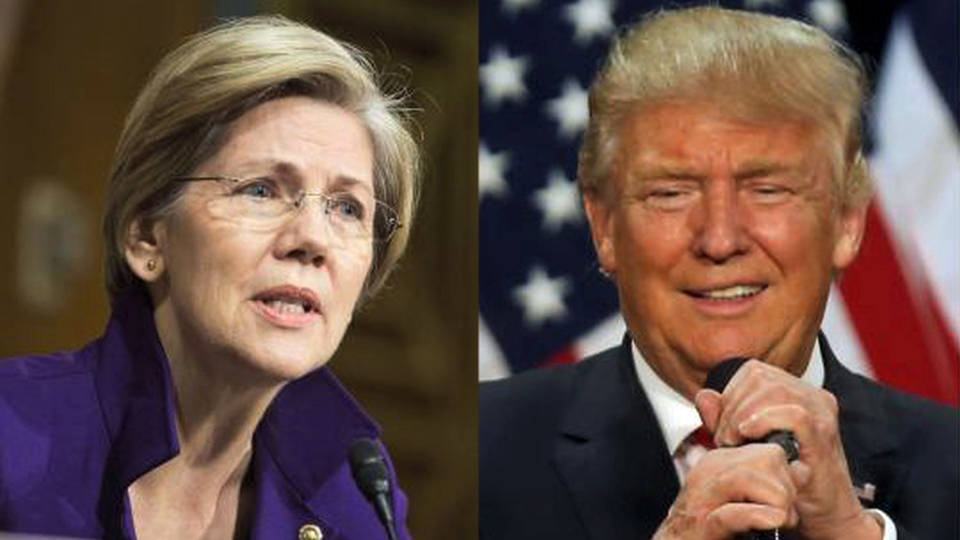
In more news from the campaign trail, Massachusetts Senator Elizabeth Warren continues to criticize presumptive Republican presidential nominee Donald Trump. Speaking at the Center for Popular Democracy’s annual gala on Tuesday, Warren called Trump an "insecure money grubber."
Sen. Elizabeth Warren: "Donald Trump was drooling over the idea of a housing meltdown because it meant he could buy up more property on the cheap. What kind of a man does that? I’ll take you exactly what kind of a man does that. It is a man who cares about no one but himself, a small—a small insecure money grubber who doesn’t care who gets hurt, so long as he makes a profit off it."
In response, Trump attempted to criticize Elizabeth Warren by using the word "Indian" and the name "Pocahontas" as racial slurs during a rally in Albuquerque, New Mexico.
Donald Trump: "Hillary Clinton has somebody—did you ever hear of Pocahontas? Huh? It’s Pocahontas Elizabeth Warren. She was going out. She is probably the senator that’s doing just about the least in the United States Senate. She’s a total failure. She said she was an Indian."
Warren says her family is part Cherokee.
TOPICS:
2016 Election
Donald Trump
Bernie Sanders and Donald Trump May Debate Each Other in California
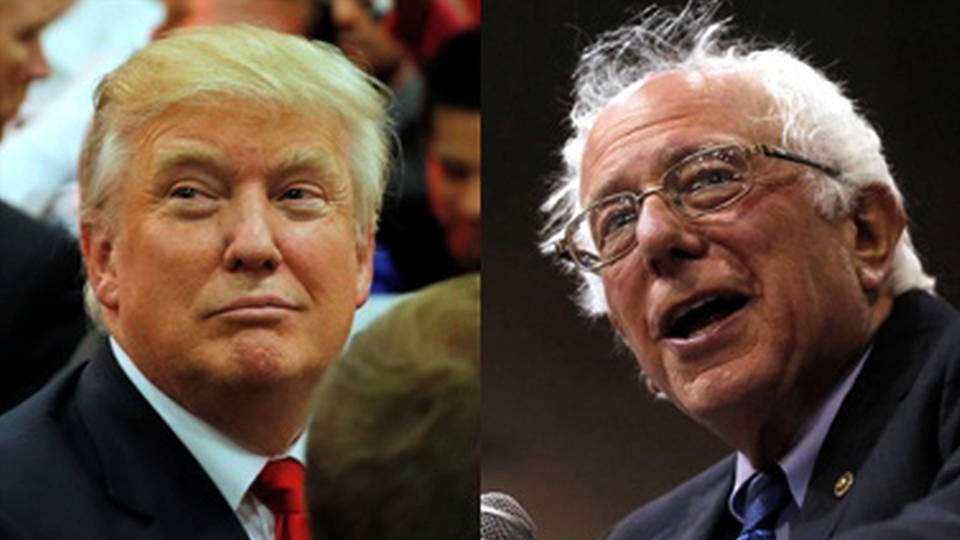
Will Donald Trump and Bernie Sanders debate each other ahead of the California June 7 primary? Donald Trump first agreed to the idea when it was proposed by Jimmy Kimmel during an interview Wednesday night. Sanders responded by tweeting "Game on." This comes after Hillary Clinton refused to debate Sanders in California ahead of the primary. Polling figures released by the Public Policy Institute Wednesday night show Sanders and Clinton in a dead heat in California.
TOPICS:
Bernie Sanders
2016 Election
Donald Trump
Cornel West Accuses Israeli PM Netanyahu of "War Crimes"

Meanwhile, racial justice scholar and activist Cornel West, who is one of Bernie Sanders’ five appointees to the Democratic Party’s platform drafting committee, has accused Israeli Prime Minister Benjamin Netanyahu of "war crimes" in the continued occupation of Palestinian territories. This comes as Netanyahu moves his government even further to the right with the addition of the right-wing nationalist Yisrael Beiteinu party. Professor West and another Sanders appointee, James Zogby, are looking to incorporate opposition to Israel’s occupation of Palestinian territories into the Democratic Party platform when the drafting committee meets at the Democratic National Convention in Philadelphia in July.
TOPICS:
Israel
Bernie Sanders
Democratic Party
Obama Apologizes for Military Contractor's Alleged Murder of Japanese Woman
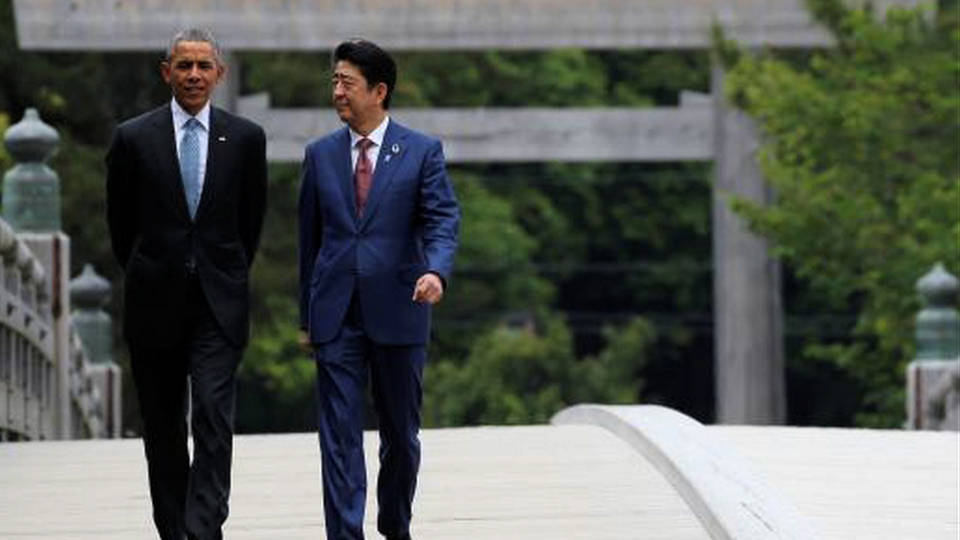
President Obama is in Japan today for the G7 summit, amid increasing tensions between the two countries over a U.S. military contractor’s alleged rape and murder of a 20-year-old Japanese woman on the island of Okinawa. Japanese Prime Minister Shinzo Abe spoke out.
Prime Minister Shinzo Abe: "I feel strong indignation about the selfish and extremely mean crime. It has not only shaken the citizens of Okinawa, but also the whole of Japan. And I have told President Obama to understand the feelings of these people."
Japanese Prime Minister Shinzo Abe was speaking at a news conference alongside President Obama. At that same news conference, President Obama apologized.
President Barack Obama: "I want to emphasize that the United States is appalled by any violent crime that may have occurred or been carried out by any U.S. personnel or U.S. contractors. We consider it inexcusable, and we are committed to doing everything that we can to prevent any crimes from taking place."
For decades, Okinawa residents have called for the expulsion of U.S. troops in large part over a history of sexual assaults. This comes as President Obama is slated to head to Hiroshima tomorrow, where he will become the first sitting U.S. president to visit the city where the U.S. dropped a nuclear bomb toward the end of World War II.
TOPICS:
Japan
11 States Sue Obama Gov't over Transgender Rights Directive
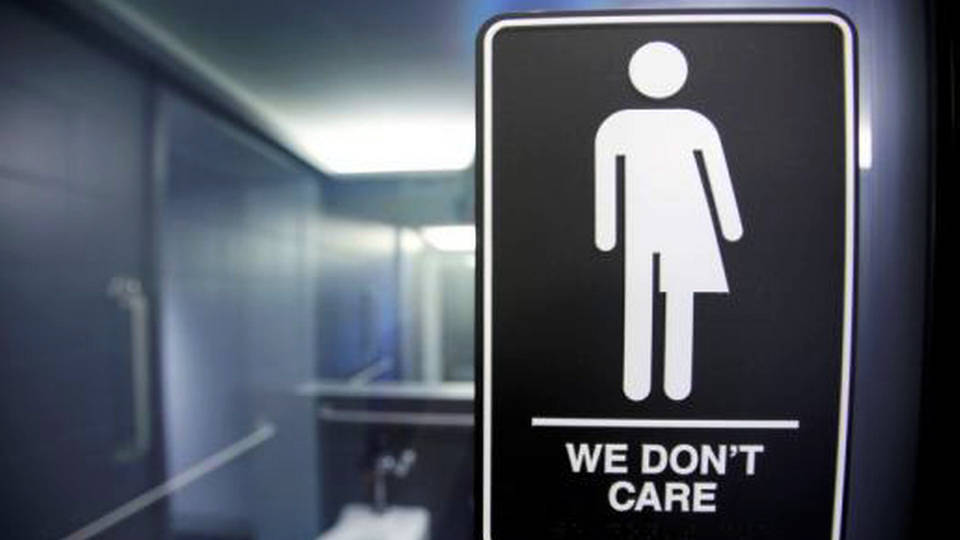
Eleven states are suing the Obama administration over its recent directive saying students have the right under federal law to use the bathroom that corresponds to their gender identity. Nine of the 11 states have Republican governors. Texas Attorney General Ken Paxton announced the lawsuit Wednesday.
Ken Paxton: "Two hours ago, the state of Texas filed a lawsuit against the U.S. Department of Education and the Department of Justice regarding their directives that open up all school bathrooms to people of both sexes. We’re taking this action to protect Harrold Independent School District, which on Monday night fulfilled a responsibility to their community by adopting a bathroom policy that puts the safety of their students first."
TOPICS:
LGBT
Taliban Appoints New Leader Following Death of Mullah Mansour

The Taliban has appointed a new leader following the death of Mullah Akhtar Mohammad Mansour in a U.S. drone strike in Pakistan on Saturday. The religious scholar Mawlawi Haibatullah Akhundzada will become the group’s new leader.
French Nuclear Power Plant Workers Vote to Join Growing Strikes
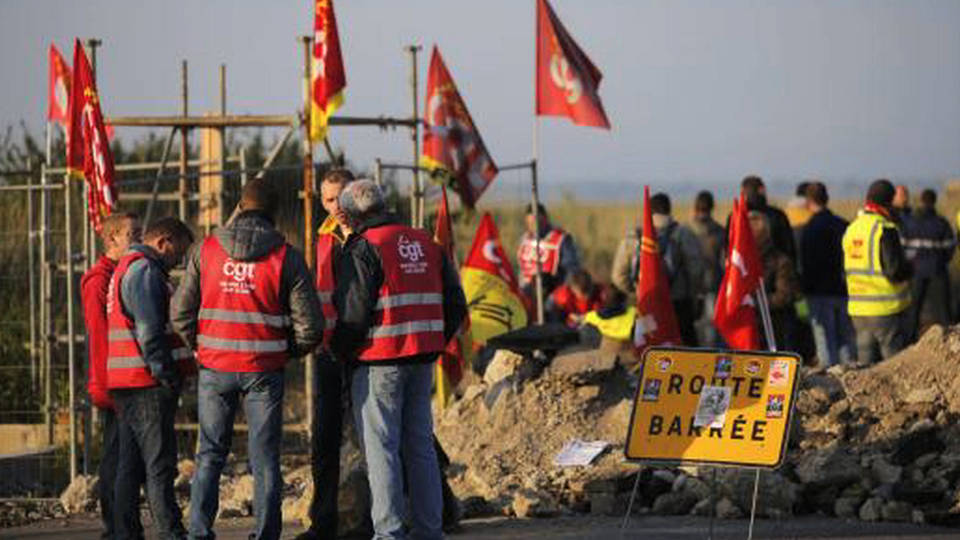
In France, workers at nuclear power plants have voted to join the growing strikes, which are threatening to immobilize the country amid protests over labor reforms. Gas stations have reported fuel shortages as protesters blockaded oil depots and shut down all eight of France’s oil refineries Tuesday. Unions are protesting reforms that would make it easier to fire workers, among other provisions. Unionist Mathieu Pinault spoke out.
Mathieu Pinault: "What we want today is for this movement to spread. All the other sectors in France seem decided to stop the factories, to paralyze the economy, so we really think that we have a wide movement which will continue with the will to impact the economy. So, in all logic, it should force the government to withdraw this bill, which isn’t at all in everyone’s interest."
U.N. Security Council Votes to Lift Arms Embargo on Liberia
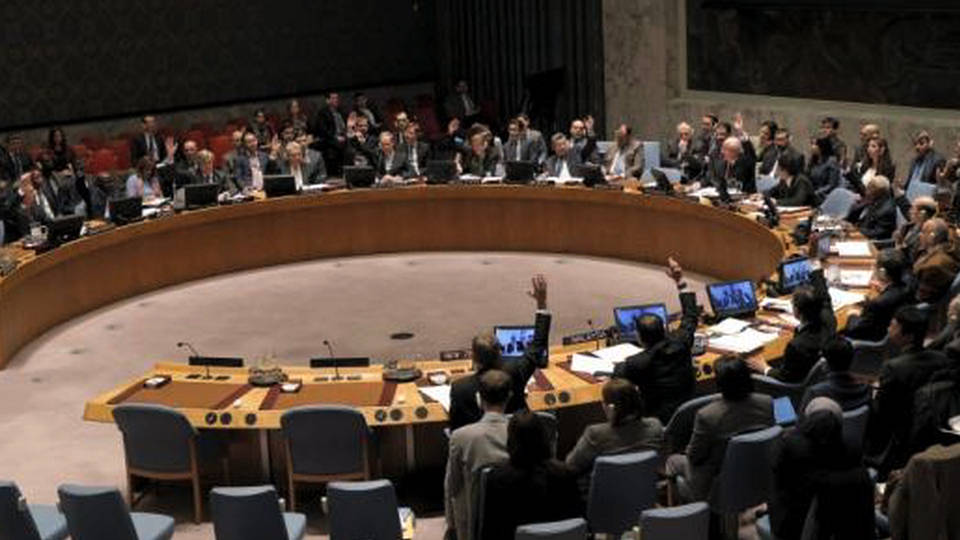
The U.N. Security Council has voted unanimously to lift sanctions and an arms embargo against Liberia. The restrictions were put in place in the early 1990s amid Liberia’s 14-year civil war, which killed as many as a quarter of a million people.
South Carolina Gov. Signs Legislation Banning Abortion After 20 Weeks
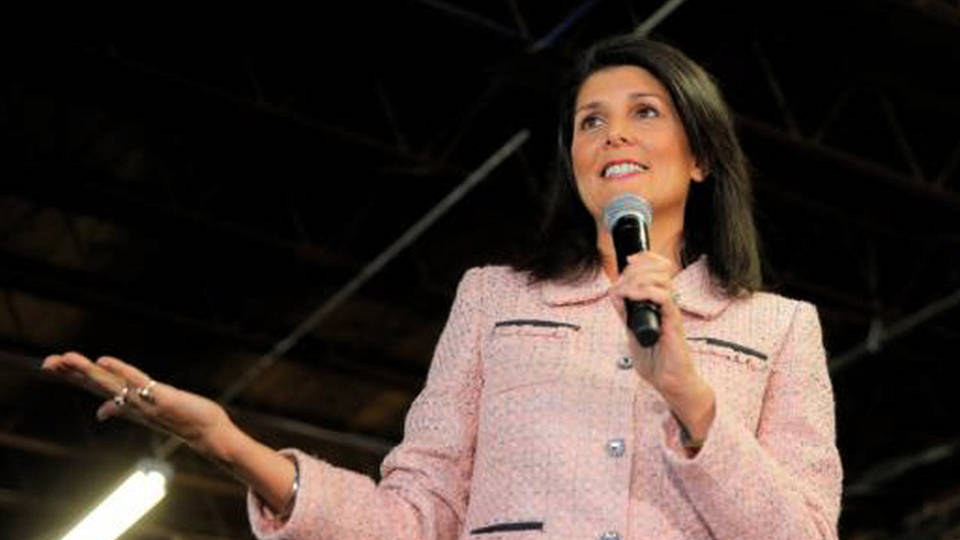
South Carolina Governor Nikki Haley has signed legislation banning abortion after 20 weeks, including in cases of rape and incest. The law takes effect immediately, making South Carolina the 13th state to make abortion illegal after 20 weeks of pregnancy.
Fast-Food Workers Pitch Occupation Outside McDonald's Headquarters
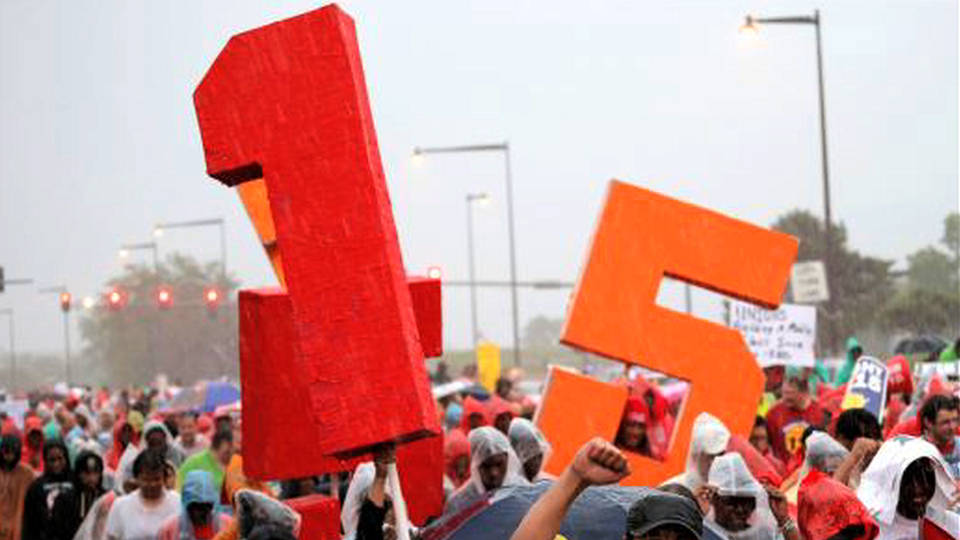
In Oak Brook, Illinois, thousands of fast-food workers have pitched tents and set up an occupation outside McDonald’s headquarters to demand a $15-an-hour minimum wage and union rights. The occupation comes as McDonald’s hosts its annual shareholder meeting today. The massive protests shut down McDonald’s headquarters Wednesday. More protests are planned for today. This comes as former McDonald’s CEO Ed Rensi has claimed in an interview with Fox Business that McDonald’s would replace workers with robots if the national minimum wage is raised to $15 an hour.
Ed Rensi: "I guarantee you, if the $15 minimum wage goes across the country, you’re going to see a job loss like you can’t believe. I was at the National Restaurant Show yesterday, and if you look at the robotic devices that are coming into the restaurant industry, it’s cheaper to buy a $35,000 robotic arm than it is to hire an employee who’s inefficient, making $15 an hour bagging french fries."
NYPD Commissioner Bill Bratton Calls Cop Watching an "Epidemic"
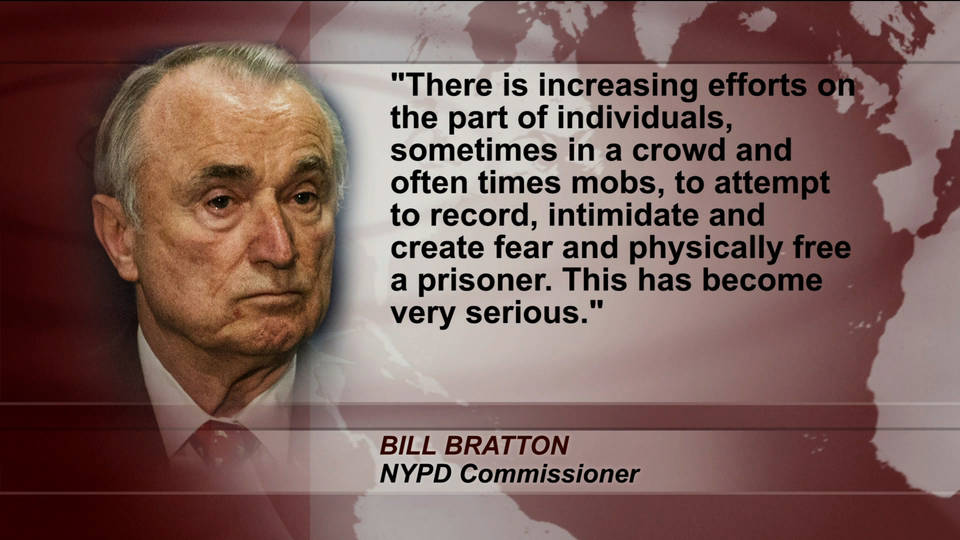
New York Police Commissioner Bill Bratton has called the growing campaign to film the police an "epidemic." The movement, known as Copwatch, seeks to hold police accountable by filming incidents of police brutality and police killings. Speaking after a conference of police chiefs on Wednesday, Commissioner Bratton said, "There is increasing efforts on the part of individuals, sometimes in a crowd and oftentimes mobs, to attempt to record, intimidate and create fear and physically free a prisoner. This has become very serious." This comes as the NYPD is facing criticism after a Harlem plainclothes police officer was caught on video pointing his gun at a group of unarmed people inside an apartment building lobby and then punching one of the residents filming him.
NY: Two Protesters Arrested for Blockading Spectra AIM Pipeline
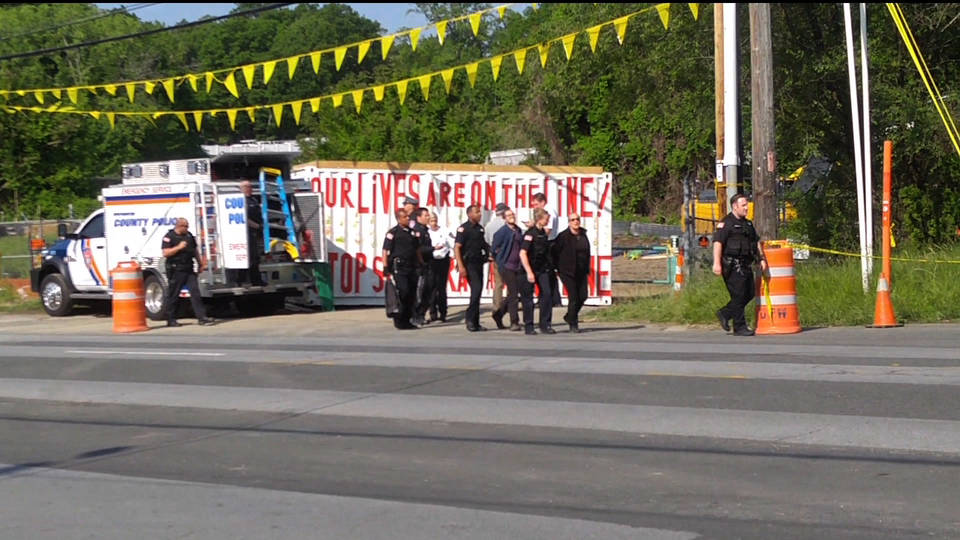
In Peekskill, New York, two protesters were arrested Wednesday after police extracted them from a shipping container blockading the construction yard of a gas pipeline. Spectra’s AIM pipeline is slated to run only hundreds of feet from the aging Indian Point nuclear power plant. Lee Stewart and Jane Kendall had locked themselves in the fully sustainable shipping container to blockade the pipeline’s construction just after dawn on Wednesday morning. They have been charged with disorderly conduct, trespassing and obstructing government administration.
TOPICS:
Natural Gas & Oil Drilling
Environment
Massachusetts: Religious Leaders Arrested Blocking Spectra Pipeline
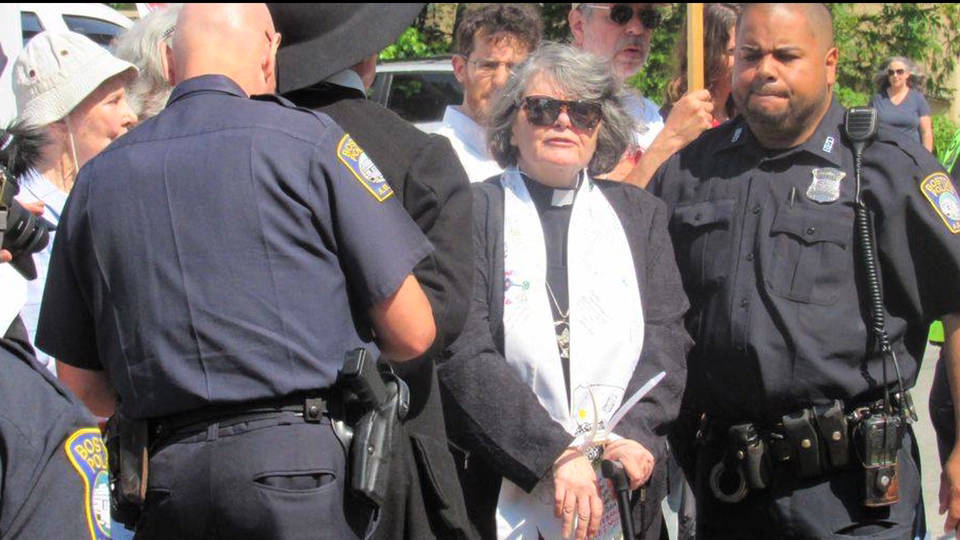
Meanwhile, in Massachusetts, more than a dozen religious leaders were arrested Wednesday for blocking construction of another Spectra gas pipeline. The interfaith group held a prayer on the construction site in West Roxbury, where Spectra is trying to build a gas pipeline. Local residents and politicians have long opposed the West Roxbury Lateral Pipeline; they say it’s dangerous for the pipeline to run alongside a quarry where there is frequent blasting.
TOPICS:
Environment
Natural Gas & Oil Drilling
Activist Sues DHS for Denying DACA Renewal over Her Activism
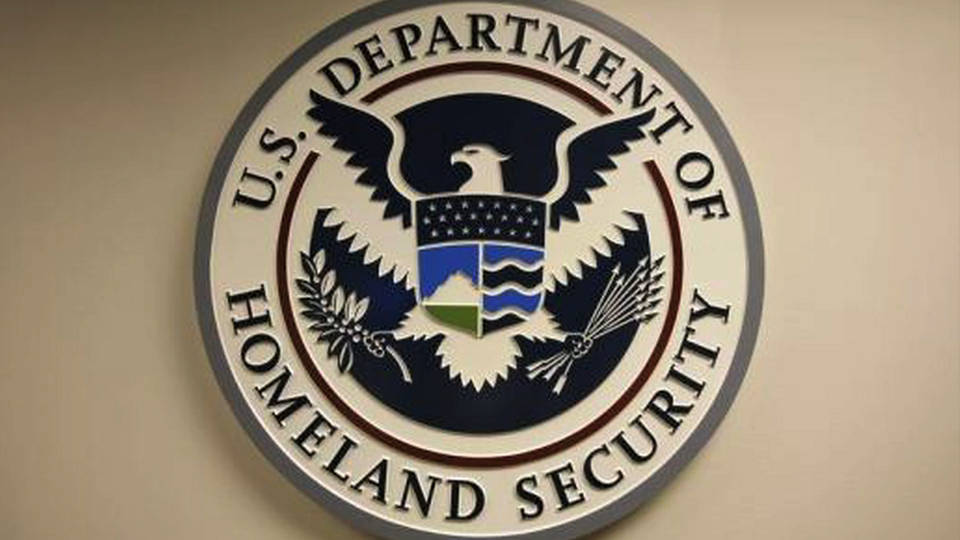
And in Chicago, a migrant justice activist is suing the Department of Homeland Security for refusing to renew her DACA protection because of her activism. Twenty-nine-year-old Ireri Unzueta Carrasco was granted Deferred Action for Childhood Arrivals status in 2013. But its renewal was denied due to her participation in civil disobedience actions. More than 100 civil and immigrant rights groups have signed on to a letter to DHS Secretary Jeh Johnson calling on the agency to renew her DACAstatus and protect the constitutional right to political expression. Ireri has organized for immigrant rights for years. In 2014, she spoke on Democracy Now! about receiving DACA protections and her decision to come out as undocumented.
Ireri Unzueta Carrasco: "Before I had the deferred action, anything could have put me in deportation proceedings, any small mistake, being at the wrong place at the wrong time, right? I really wanted to travel, and traveling isn’t something that you can just do, necessarily, right? And sometimes there are risks involved, and there are, you know, different ways to get stopped. And so, this is a risk that I was running every day. To me, when I decided to come out publicly and talk about my status, it was a decision about that. If this is something that I’m facing every day, then I need to take this head-on. I need to be able to show my side of the story publicly, and I need to be able to use that to benefit the other members of my community."
TOPICS:
Immigrant Rights
Donate today:
Follow:




SPEAKING EVENTS

"Homeland Security Secretary Jeh Johnson Takes High-School Detention to a New Level" by Amy Goodman and Denis Moynihan
Thursday, Jan. 28, was a cold morning in Durham, North Carolina. Wildin David Guillen Acosta went outside to head to school, but never made it. He was thrown to the ground and arrested by agents from U.S. Immigration and Customs Enforcement (ICE). He has been in detention ever since. Wildin, now 19 years old, fled his home in Olancho, Honduras more than two years ago. He was detained when crossing the border, but, as he was a minor at the time, he was allowed to join his family in North Carolina. He started out at Riverside High School, and was set to graduate this June. He wanted to become an engineer. Instead, he has been locked up in the notorious Stewart Detention Center in rural Lumpkin, Georgia, which is run by the for-profit Corrections Corporation of America.
Wildin is just one of hundreds of thousands of children who have fled the violence of Central America in recent years, either alone or, often, with their mothers. They come primarily from Honduras, Guatemala and El Salvador. Honduras is now one of the world’s most violent countries, and Olancho has one of the highest murder rates there, causing many to flee. The U.S. Army and the Drug Enforcement Administration both have special-forces units permanently stationed there, joining in counternarcotics operations that have also killed Hondurans.
Wildin was arrested in part of a series of immigration raids, dubbed “Operation Border Guardian.” Many believe its intent was to create fear among those still in Central America who might consider taking the perilous journey north to the U.S. “As I have said repeatedly, our borders are not open to illegal migration,” Secretary of Homeland Security Jeh Johnson said at the time. “If you come here illegally, we will send you back consistent with our laws and values.” Immediately after Wildin’s arrest, family, friends, classmates and teachers at Riverside High demonstrated their values, rallying to support him and five others who were similarly arrested. The group of imprisoned youth is often referred to as the “NC6.” Durham’s Human Relations Commission appealed to ICE to release him, as did the Durham City Council.
“There is so much fear in our community, because, unfortunately, he is not the only child that they have detained,” said one of Wildin’s teachers, Ellen Holmes, in a support video. “It’s creating absences and dropouts in our schools. It’s creating just a huge feeling of fear inside our school and in our community.” While there is scant evidence that the mass arrests and deportations have slowed the flow of Central American refugees to the U.S., they have certainly scared students and families currently here, forcing them to keep their kids out of school lest they be swept up like Wildin.
Wildin’s request for asylum was denied, and on March 19, an immigration judge denied his appeal to reopen his case. He was set for deportation back to Honduras on March 20. However, bowing to the enormous public pressure brought by this youth-led grass-roots organizing, ICE Director Sarah Saldana issued an order that morning, delaying his deportation. Wildin’s case for asylum is before the Board of Immigration Appeals, a process that could take months or even years to resolve.
“He should be released. Ninety days, by any standard, is an egregious period of time to be spending in detention,” Paromita Shah told us on the “Democracy Now!” news hour. She is the associate director of the National Immigration Project of the National Lawyers Guild, and was in Washington, D.C., with several Riverside High students and teacher Ellen Holmes, visiting members of Congress and Education Secretary John B. King Jr., asking them to support Wildin.
Axel Herrera was one of the students who went to Washington. Like Wildin, he was an undocumented immigrant from Honduras, but entered at the age of 7, and thus qualified for Deferred Action for Childhood Arrivals, or DACA. “We’ve talked to representatives. We’ve made calls. We’ve sent letters. We’ve gotten support from a few of our congressmen in North Carolina to ask for their release,” he told us. “But we haven’t had the response we’ve wanted, which is to have Wildin and have some of the other NC6 back at our schools.”
Wildin Acosta remains locked up in ICE’s private prison in Georgia. His request that his schoolwork be sent to him was initially denied. After public outcry, the warden relented. Many high-school students get detention for refusing to study. Wildin is stuck in permanent detention, and he has to fight for his right to study. That is determination and commitment Jeh Johnson and everyone at ICE should agree is “consistent with our values.”
FEATURED TOPIC

Noam Chomsky on Obama's Visit to Hiroshima & More
207 West 25th Street, 11th Floor
New York, New York 10001, United States
---------------------
---------------------


No comments:
Post a Comment